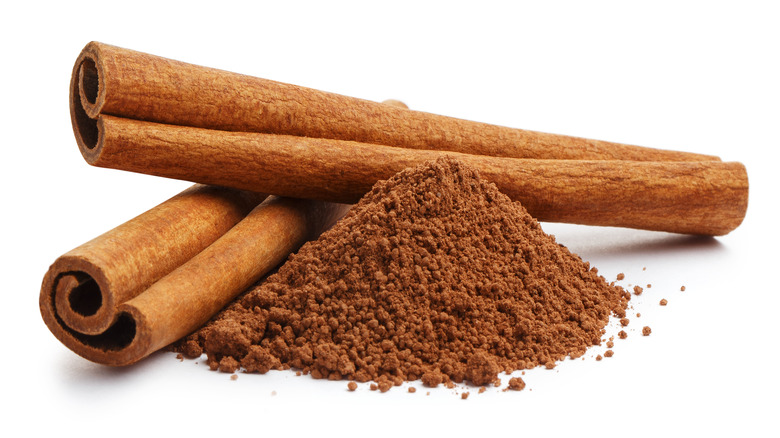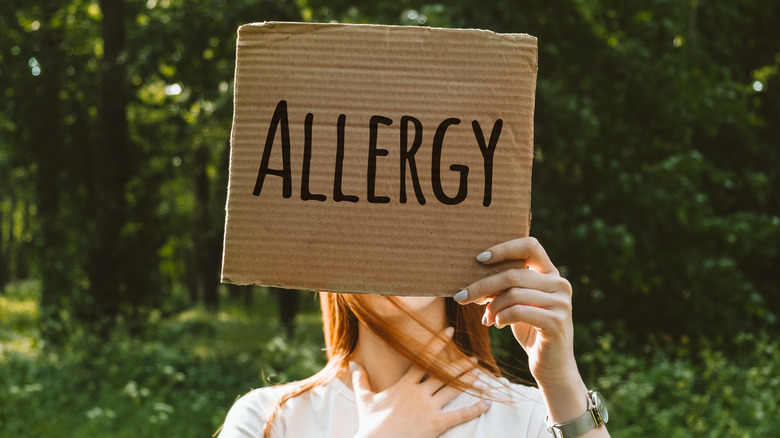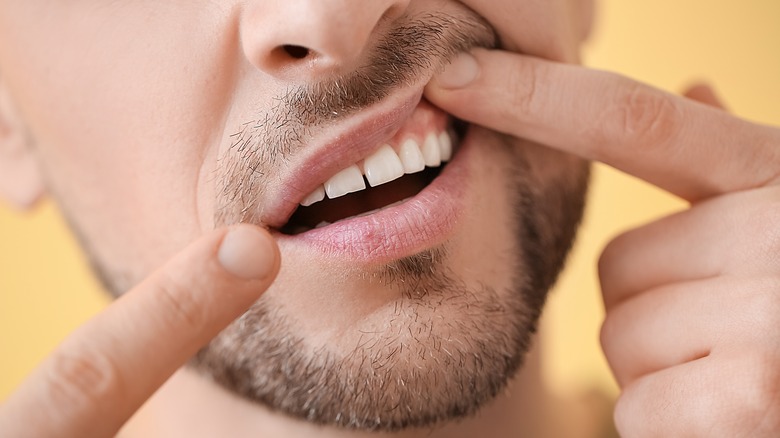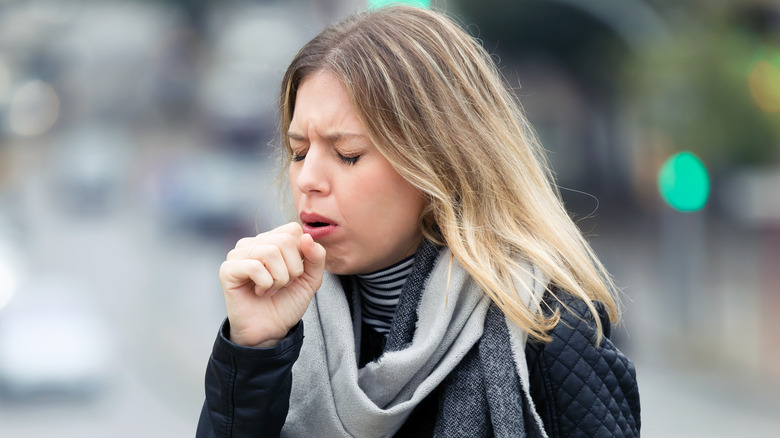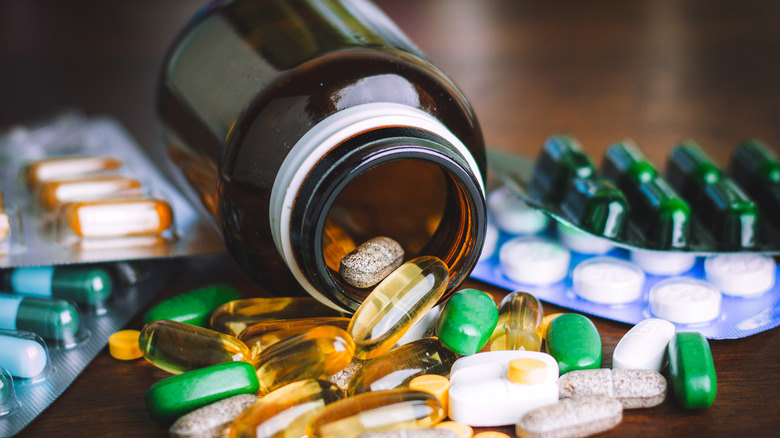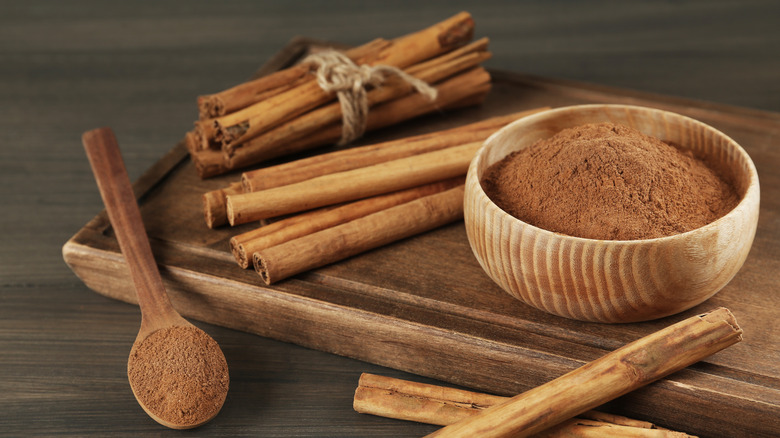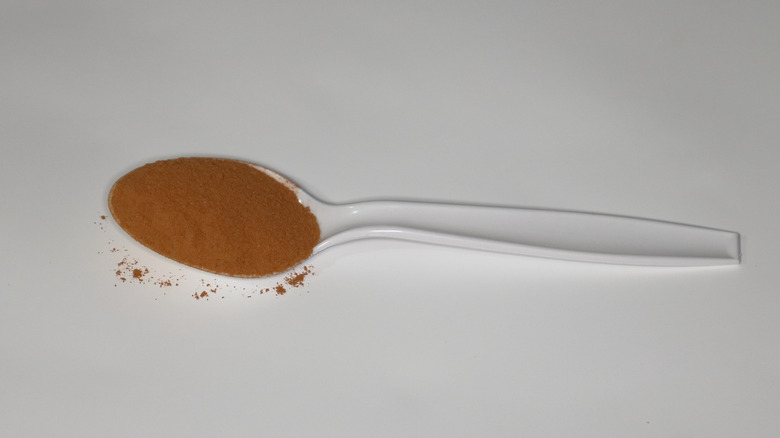10 Surprising Side Effects Of Eating Too Much Cinnamon
Not all cinnamon is created equal. There are two common types of cinnamon, cassia and Ceylon. Cassia, the one on supermarket shelves, is widely available and more affordable than Ceylon. Ceylon is often known as true cinnamon, but both are made from the inner bark of Cinnamomum trees (via Healthline).
While we might think of the spice as harmless, there are some surprising side effects to eating too much cassia cinnamon because it contains the chemical coumarin. While Ceylon cinnamon has only trace amounts of coumarin, cassia cinnamon has seven to 18 milligrams of coumarin per teaspoon, according to a 2012 study.
According to a 2010 review published in the Molecular Nutrition and Food Research, the tolerable amount of cassia cinnamon per day is 0.1 mg/kg body weight. For someone who's 160 pounds (73 kilograms), the limit is 7.3 milligrams, which is less than one and a half teaspoons.
You may know some of the incredible health benefits of cinnamon, but you should be familiar with some of the surprising side effects of cinnamon. It turns out, overeating cassia cinnamon has the potential to cause liver damage, mouth sores, low blood sugar, breathing problems, and interactions with some medications, among other issues.
Cinnamon isn't always listed on product labels
Sometimes it's easy to see which foods have cinnamon. Some products go out of their way to feature the word "cinnamon" in their name. Others like coffee cake are literally covered with cinnamon. But as Medical News Today points out, cinnamon can be in a variety of food products like soups, spice blends, and flavored rice — and unfortunately, not seeing "cinnamon" on a product's label doesn't necessarily mean there's no cinnamon in it.
If a food's label lists "spices" or "mixed spices" under its ingredients, then it might contain cinnamon, according to the United States Food and Drug Administration (FDA). "Flavoring" and "flavors" are other words to watch out for if you're concerned about how much cinnamon is in your diet. And it's important to remember that when you buy a spice blend for cooking or baking, you could be adding cinnamon to a dish, via Medical News Today. For example, according to The Spruce Eats, the spice blend known as garam masala typically contains cinnamon.
Beyond foods, there are other products that don't always have the word "cinnamon" on their label even though they contain cinnamon (per Medical News Today). For example, chewing gum can have cinnamon, as can toothpaste and mouthwash. Even items like perfumes might contain cinnamon and list only the word "fragrance" on their labels.
Some people may be allergic to cinnamon
Here's the good news. According to MedicineNet, only around 2% of allergies that are undiagnosed are spice allergies. So, your odds of having a cinnamon allergy are pretty low. But the bad news is that if you do have a cinnamon allergy, eating it, as well as touching it or breathing it in, can cause a wide range of unpleasant and sometimes dangerous symptoms. Contact with cinnamon can make someone dizzy, itchy, and/or nauseous if they are allergic. They also might experience vomiting, diarrhea, problems breathing, swelling in their face or elsewhere on the body, and abdominal pain. In addition, a person could break out into hives, feel congested, begin wheezing, and experience tingling in areas like their lips and tongue. It's even possible for someone with a cinnamon allergy to faint. And if you guessed that a cinnamon allergy can be fatal, you'd be absolutely correct.
While it's not a common occurrence, knowing potential warning signs of cinnamon-related anaphylactic shock is important so there's no delay getting medical help. Symptoms like difficulty breathing, abdominal pain, and heart palpitations could be red flags that someone might go into shock. Other possible signs that a cinnamon allergy is putting someone's life in danger include their voice becoming hoarse, their throat tightening, or their blood pressure becoming low. Also, it's possible for someone with a cinnamon allergy to go into cardiac arrest.
Cinnamon can cause lip and mouth inflammation
Although a cinnamon allergy can cause swelling in the face, that's not the only area of the body that might become swollen and affected by cinnamon (via MedicineNet). For example, as Verywell Health points out, cinnamon can cause stomatitis, in which the lips or parts of the mouth become inflamed. And this condition comes with a list of other unpleasant possible symptoms including burning, mucosal peeling, pain, and ulcers. But if you're thinking, "I'll just switch to products that are flavored to taste like they use cinnamon," think again.
Sometimes manufacturers use the compound cinnamaldehyde to give products a cinnamon taste, via the Environmental Protection Agency (EPA). Remember, the compound cinnamaldehyde comes from cassia oil and cinnamon bark oil. And according to The Open Dentistry Journal, cinnamaldehyde can cause contact stomatitis. And although you're more likely to develop stomatitis from products like toothpaste and mouthwash rather than food, it's important to be aware of all possible sources of cinnamon in both your diet and your daily routine, per Verywell Health.
Cinnamon can cause mouth issues
It's important to point out that only a small number of those who eat or use products that contain cinnamon will have mouth issues, according to The Washington Post. With that said, there's a specific demographic that tends to experience problems in connection to their cinnamon usage.
Before we learn more about this group, however, let's explore the two reasons why mouth problems can happen because of cinnamon. As Michael A. Siegel, an associate professor in the department of oral medicine at the University of Maryland at Baltimore, told The Washington Post, a person can have an allergic reaction to cinnamon, or the cinnamon could just be irritating the mouth. While cinnamon-induced mouth irritation can be unpleasant and cause dry and burning sensations, a cinnamon allergy can lead to mouth sores that develop 48 to 72 hours after being exposed to cinnamon.
As for which group is most likely to have mouth-related problems because of cinnamon, Richard L. Miller, a professor of oral pathology at the University of Louisville School of Dentistry, explained to The Washington Post that, "The majority of the cases we've seen have been [people chewing gum] in smoking cessation. It's not the occasional user. It's the person using two, three packs of gum or candy [a day]." So, if you're trying to quit smoking and are finding your cinnamon gum is causing you mouth problems, you might want to visit the Centers for Disease Control and Prevention (CDC) for alternative tips and resources to help you.
Cinnamon can lower your blood sugar
This next quality of cinnamon might not sound like a bad thing. After all, high blood sugar can be problematic, and as Healthline notes, some believe that cinnamon can slow down how quickly food leaves one's stomach, which could keep blood sugar from spiking after meals. Other research suggests that cinnamon might block enzymes that help the small intestine break down carbohydrates (via Springer Nature). However cinnamon manages it, the evidence points to it being able to lower blood sugar. However, cinnamon taken in combination with blood sugar treatments like insulin can cause potentially low blood sugar to dangerous levels (via Healthline).
Symptoms of low blood sugar, or hypoglycemia, can include headache, irritability, fatigue, perspiration, shakiness, and anxiety, per Mayo Clinic. It also can make it more difficult to concentrate, increase one's heartbeat or make it irregular, and lead to nausea, lightheadedness, and/or dizziness. In addition, a person experiencing hypoglycemia could become pale and feel either numbness or tingling in their tongue, lips, or cheeks. Furthermore, a worsening case of hypoglycemia can cause issues like slurred speech, blurry vision, tunnel vision, and loss of coordination. It also can cause changes in behavior, confusion, problems completing simple tasks, and nightmares. A person can also experience seizures and loss of consciousness because of hypoglycemia. If you're taking insulin or medication for your blood sugar, talk with your healthcare professional about how much cinnamon is safe to have in your diet.
Inhaling cinnamon can cause breathing issues
Imagine this: You're having a coffee drink that's topped with whipped cream and a sprinkling of cinnamon. You quickly take a healthy sip, but you accidentally inhale some of the cinnamon. Chances are that cinnamon is going to make you start coughing. Now, unless you have a cinnamon allergy (and if so, you'd never order this drink in the first place), that tiny bit of cinnamon won't hurt you. But inhaling a large amount of cinnamon can be detrimental to your health.
According to Healthfully, cinnamon is sometimes ground into a very fine powder. While this might be good for different recipes, it can also make the cinnamon easy to accidentally inhale, which can cause irritation in one's throat (hence, the coughing in the above scenario). And as an article in the journal Pediatrics explains, the cellulose fibers in cinnamon powder don't dissolve or decompose. So, inhaling a large amount of cinnamon can not only lead to severe coughing but also could increase the chances of developing lesions and scarring in one's airways.
Of course, if you have a condition that affects your breathing, inhaling cinnamon can be very dangerous. The University of Michigan Health System warns that bronchial constriction can occur because of cinnamon (via Healthfully). So, asthmatics, for example, need to be careful not to inhale cinnamon. Also, someone with chronic obstructive pulmonary disease (COPD) should be wary of anything that could further obstruct their breathing (per Mayo Clinic).
It can lead to liver damage
Eating large amounts of cassia cinnamon can up your chances of liver damage, via WebMD. But why cassia cinnamon in particular, as opposed to Ceylon? Well, it comes down to one word: coumarin.
As Medical News Today explains, Cassia cinnamon has far more of the compound coumarin than Ceylon cinnamon. In fact, according to one study, there can be as much as 63 times more coumarin in cassia cinnamon powder than Ceylon cinnamon powder (per Medical News Today). And as the BBC notes, coumarin can be toxic for the liver, especially if you consume it over a long period of time. In fact, Dirk Lachenmeier from the Chemical and Veterinary Investigation Laboratory (CVUA) of Karlsruhe, Germany, told the BBC, that "the effects [on the liver] build up over years," meaning that by the time someone realizes the coumarin in their cinnamon has hurt their liver, the damage might already by done.
Of course, a simple solution would be buying only Ceylon cinnamon to avoid potentially damaging your liver. Unfortunately, as Medical News Today points out, Ceylon cinnamon is pricy, so most cinnamon products in the U.S. use the less expensive cassia cinnamon. That doesn't mean it isn't available online, but be prepared to pay more for this ingredient or supplement.
Cinnamon can interact with certain medications
Now to be fair, it might not be necessary to completely cut the cinnamon out of your diet even if you regularly take certain medicine. As Healthline explains, small to moderate amounts of cinnamon shouldn't be a problem. But with that said, both Ceylon and cassia cinnamon can interact with a number of different types of medications.
As WebMD points out, Ceylon cinnamon can interact with not just medications used to treat diabetes, but also drugs used to lower high blood pressure. These medications plus cinnamon (especially a large amount of it) can cause blood sugar and blood pressure to drop to dangerously low levels. And that's not all. Cassia cinnamon can cause liver damage if consumed in large quantities, per WebMD – so you will want to avoid cassia cinnamon if you take any medications that can also harm the liver. These include statins, which are prescribed to help manage cholesterol (via American Journal of Case Reports), as well as a variety of antibiotics, antifungals, blood thinners, chemotherapy drugs, and psychotropics, among others (via Family Practice Notebook). If you are taking any type of medication (over-the-counter or otherwise), speak with your healthcare professional about how much cinnamon is safe for your diet.
It can cause stomach issues
When it comes to cinnamon, it's important to keep an old saying in mind: Too much of a good thing can be bad. Case in point, the National Center for Complementary and Integrative Health explains that cinnamon can cause gastrointestinal problems if someone consumes it both in large quantities and over a long period of time.
As Healthfully notes, large quantities of cinnamon can make one feel like they're experiencing stomach cramps. This is because cinnamon can cause irritation in the stomach's lining. And while cinnamon can be the culprit behind stomach pain, it can be even more problematic for someone who has stomach ulcers. In fact, cinnamon can make an ulcer worse and lead to bleeding. So, even though cinnamon supplements are sometimes recommended to help with gastrointestinal problems (according to the National Center for Complementary and Integrative Health), make sure to speak with a healthcare professional before using cinnamon to treat health concerns like stomach issues.
Cinnamon and cancer
When it comes to cinnamon and cancer, the most accurate description for their relationship is "It's complicated." And at the center of it all is a compound found in cinnamon called coumarin. As an article in Letters in Drug Design & Discovery explains, there is evidence that coumarin has the potential to help with breast cancer since it might help inhibit the growth and development of breast cancer cells. It also might be beneficial in photochemotherapy and antitumor treatments.
Despite all of this potential good, however, there are concerns about coumarin, especially in large amounts. In a study published in Fundamental and Applied Toxicology, both rats and mice found that the rats that were given 5000 parts per million of coumarin experienced "increased incidences" of conditions like parenchymal liver cell tumors. They also sometimes developed cholangiocarcinoma, which according to the Mayo Clinic is a cancer that affects the bile ducts. Of course, humans and rats are very different physically, but the results of this study do point to large amounts of coumarin having the potential to increase one's chances of developing liver-related cancer. So, if you have a history of any cancer in your family or other reasons why you're concerned about developing cancer, you should speak with your doctor about what steps you can take to lower your chances of developing this health issue.
The dangers of the 'Cinnamon Challenge'
We can't discuss the potential dangers of large amounts of cinnamon without talking about the cinnamon challenge. In case you've never heard of it, the Cinnamon Challenge is when someone attempts to swallow a spoonful of ground cinnamon within a minute's time (via The New York Times).
This might sound unpleasant at worst — but as The New York Times reported, people who have tried the cinnamon challenge have in some cases wound up on ventilators. But this isn't surprising when you consider that some Cinnamon Challenge participants wind up accidentally inhaling cinnamon, which can cause serious side effects (via Pediatrics). Some people have experienced vomiting, nosebleeds, and even collapsed lungs after undertaking the challenge. "People are being poisoned and sickened because of this," Dr. Steven E. Lipshultz, a professor of pediatrics at the University of Miami Miller School of Medicine, told the Times. Dr. Lipshultz helped author a report that showed how the Cinnamon Challenge has resulted in people going to the emergency room and/or seeking help from poison control centers.

